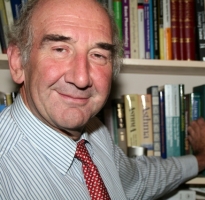Imperial scientists among the most influential in Europe for respiratory research

Four academics from the National Heart and Lung Institute (NHLI) at Imperial College London have recently been named among the 30 researchers in Europe with the most citations in respiratory medicine.
by Sam Wong
Monday 23 May 2011
Four academics from the National Heart and Lung Institute (NHLI) at Imperial College London have recently been named among the 30 researchers in Europe with the most citations in respiratory medicine, reflecting the major contributions that they have made to lung research.
See also:
Related news stories:
The analysis, by the journal LabTimes, counted how many times the work of different authors was cited in all journals between 1998 and 2009. No other institution in Europe had as many researchers in the top 30.
Professor Peter Barnes came top of the list, with over 26,000 citations – almost twice as many as the second most cited author. Professors Fan Chung, Stephen Durham and Ian Adcock were ranked 8th, 15th and 23rd respectively.
The four Imperial researchers are internationally recognised for their work in three common diseases:
- Chronic Obstructive Pulmonary Disease (COPD) is a condition of progressive inflammation of the lung that includes emphysema and chronic obstructive bronchitis. In the UK, it affects around one in ten adults over the age of 40 and it kills more women than breast cancer.
- Asthma is a long-term condition that can cause a cough, wheezing and breathlessness. 5.4 million people in the UK are currently receiving treatment for asthma. Basic research at Imperial provided the rationale for the early use of inhaled corticosteroids and drug combinations which are now used by millions of asthma patients.
- Allergies affect one in three people in the UK and a quarter of the population suffers from hay fever, a condition that can have a major impact on school or work performance, sleep quality and leisure activities during summer months.
The researchers’ work aims to understand the fundamental processes that drive these and other respiratory diseases and why certain drugs are effective in some patients but not others.

Professor Peter Barnes
Professor Barnes said: “Corticosteroids are very effective at treating mild asthma, but they don’t work against very well in severe asthma or COPD. A lot of our work is aimed at understanding why that is and how we can overcome this problem. These questions are relevant to all sorts of inflammatory diseases, such as cystic fibrosis and also diseases outside the lung, such as rheumatoid arthritis. By understanding the underlying cellular mechanisms of steroid resistance in these diseases, our research aims to identify new targets for treatments.”
Professor Chung said: “This analysis covers a decade of work, and the results are really encouraging. They show that our work is having a major impact on respiratory research worldwide.” Professor Adcock said: “Our work has formed the scientific basis for modern methods of treating asthma and COPD. We’re optimistic that our ongoing research will lead to new treatments and drug combinations that will really benefit people who suffer from these conditions.”
Professor Durham said: “Patients with hayfever who do not respond to anti-allergic drugs may benefit from immunotherapy – an injection treatment with a grass allergen vaccine. We have shown that immunotherapy not only controls symptoms but also induces long term disease remission for years after stopping it. Our work has contributed to the registration of two new vaccines throughout Europe – the first in 35 years. We have also been the lead centre in a recent novel development of a sublingual (under the tongue) vaccine which is safer than the injection route. We have just initiated a large single centre comparison of the two methods of immunotherapy, thanks to a major grant from the National Institutes of Health.”
Professor Michael Schneider, head of the NHLI at Imperial, said: “We applaud the success of NHLI's respiratory researchers for this recent recognition, which attests to the outstanding quality of their basic and translational science, productivity, impact, and sustained leadership position in Europe.”
Image: Macrophages (immune cells) from patients with COPD and fluorescently labelled Haemophilus influenzae bacteria, seen under a confocal microscope. Macrophages from COPD patients are less able to engulf and kill bacteria, which may explain why the airways get colonised by these bacteria, leading to acute symptoms.
Article text (excluding photos or graphics) © Imperial College London.
Photos and graphics subject to third party copyright used with permission or © Imperial College London.
Reporter
Press Office
Communications and Public Affairs
- Email: press.office@imperial.ac.uk
